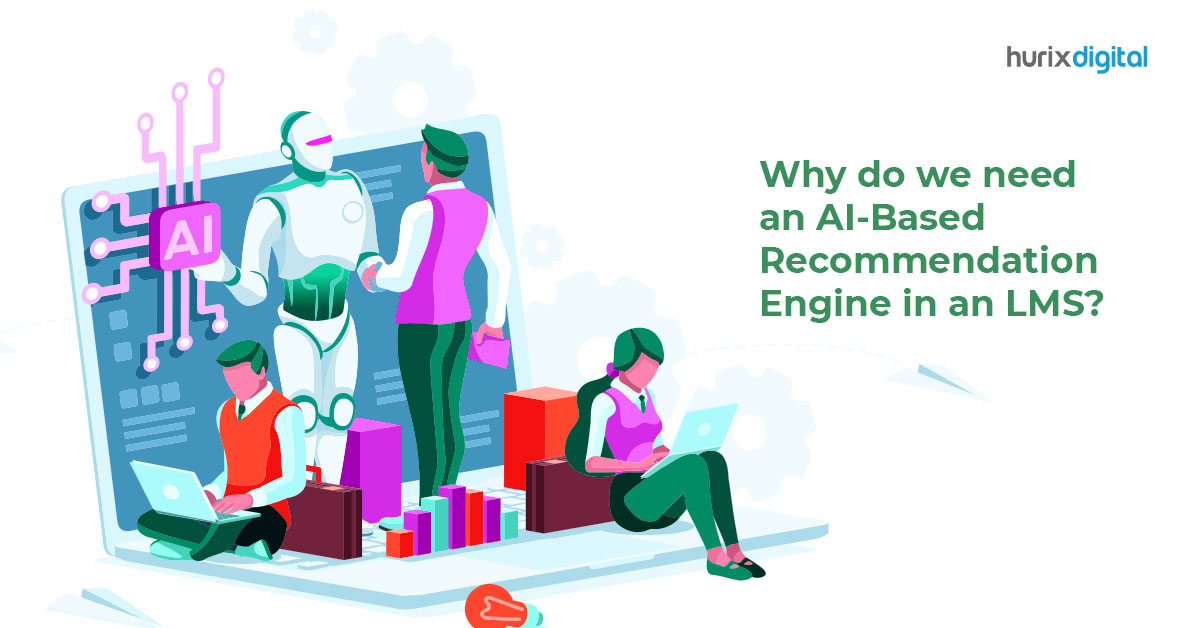Why do we need an AI-Based Recommendation Engine in an LMS?
An AI-based recommendation engine is an advanced feature of a Learning Management System (LMS) that can significantly improve the learning experience for students. The recommendation engine uses machine learning algorithms to analyze student data and suggest personalized learning paths and resources to students. In this blog post, we will discuss the benefits of implementing an AI-based recommendation engine in an LMS, how it works, and its potential impact on the future of education.
A recommendation engine within an LMS is a type of machine learning that uses data from the learners and helps to predict, narrow down and find what e-learning courses should be taken by the learners based on their previous performance.
Artificial intelligence algorithms within a recommender help to predict with accuracy and solve data inadequacy and cold start problems (issues where the recommender engine cannot draw any inferences because it does not provide enough information).
An AI-based recommendation engine can be a valuable addition to a Learning Management System (LMS) for several reasons:
- Personalization: An AI-based recommendation engine can provide personalized learning experiences for each user based on their learning preferences, past performance, and interests. By understanding the individual needs of learners, the system can suggest relevant and personalized content, courses, and learning activities, which can increase engagement and motivation.
- Efficiency: With an AI-based recommendation engine, learners can quickly access the content they need, rather than wasting time searching through the LMS for relevant resources. This can save learners time and help them stay focused on their learning goals.
- Scalability: As the number of learners using an LMS grows, it can become increasingly challenging to manage and deliver personalized learning experiences. An AI-based recommendation engine can help automate the process of content curation, making it possible to scale personalized learning to a larger audience.
- Continuous improvement: By analyzing data on learner behavior and performance, an AI-based recommendation engine can identify areas where learners are struggling and suggest ways to improve their learning outcomes. This feedback loop can help LMS administrators continuously improve the content and learning experiences offered on the platform.
Overall, an AI-based recommendation engine can enhance the effectiveness and efficiency of an LMS, making it a more valuable tool for learners and educators alike. Hurix’s AI/ML Labs have been successful in developing T5 models and training them with TB size of data to bring more than 90% accuracy for the recommendation.
Conclusion
AI-based recommendation engines have revolutionized the way students learn in a Learning Management System. By analyzing student data and suggesting personalized learning paths and resources, these engines have helped students to better understand complex topics and improve their learning outcomes.
The benefits of an AI-based recommendation engine are numerous, including increased student engagement, higher retention rates, and better learning outcomes. As technology continues to advance, AI-based recommendation engines will become increasingly sophisticated, providing educators with new tools to improve student learning. As a result, the implementation of an AI-based recommendation engine in an LMS will play a crucial role in shaping the future of education.

SVP & Head – Hurix Technology Solutions
Global Delivery head with 25 years of working experience in NYC investment banks and fintech companies. Hands-on technology delivery management and program management, accountable for stakeholder relationships, Strategic roadmap, P&L, Revenue growth, Account Management, and employee satisfaction.









